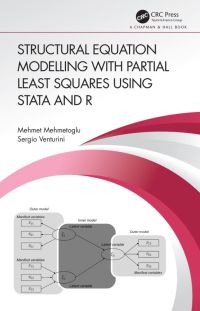Buy Structural Equation Modelling with Partial Least Squares Using Stata and R
1st Edition PDF ebook by author Mehmet Mehmetoglu; Sergio Venturini – published by Chapman & Hall in 2021 and save up to 80% compared to the print version of this textbook. With PDF version of this textbook, not only save you money, you can also highlight, add text, underline add post-it notes, bookmarks to pages, instantly search for the major terms or chapter titles, etc.
You can search our site for other versions of the Structural Equation Modelling with Partial Least Squares Using Stata and R
1st Edition PDF ebook. You can also search for others PDF ebooks from publisher Chapman & Hall, as well as from your favorite authors. We have thousands of online textbooks and course materials (mostly in PDF) that you can download immediately after purchase.
Note: e-textBooks do not come with access codes, CDs/DVDs, workbooks, and other supplemental items.
eBook Details:
Full title: Structural Equation Modelling with Partial Least Squares Using Stata and R
1st Edition
Edition: 1st
Copyright year: 2021
Publisher: Chapman & Hall
Author: Mehmet Mehmetoglu; Sergio Venturini
ISBN: 9780429170362, 9780429528859
Format: PDF
Description of Structural Equation Modelling with Partial Least Squares Using Stata and R
1st Edition:
Partial least squares structural equation modelling (PLS-SEM) is becoming a popular statistical framework in many fields and disciplines of the social sciences. The main reason for this popularity is that PLS-SEM can be used to estimate models including latent variables, observed variables, or a combination of these. The popularity of PLS-SEM is predicted to increase even more as a result of the development of new and more robust estimation approaches, such as consistent PLS-SEM. The traditional and modern estimation methods for PLS-SEM are now readily facilitated by both open-source and commercial software packages. This book presents PLS-SEM as a useful practical statistical toolbox that can be used for estimating many different types of research models. In so doing, the authors provide the necessary technical prerequisites and theoretical treatment of various aspects of PLS-SEM prior to practical applications. What makes the book unique is the fact that it thoroughly explains and extensively uses comprehensive Stata (plssem) and R (cSEM and plspm) packages for carrying out PLS-SEM analysis. The book aims to help the reader understand the mechanics behind PLS-SEM as well as performing it for publication purposes. Features: Intuitive and technical explanations of PLS-SEM methods Complete explanations of Stata and R packages Lots of example applications of the methodology Detailed interpretation of software output Reporting of a PLS-SEM study Github repository for supplementary book material The book is primarily aimed at researchers and graduate students from statistics, social science, psychology, and other disciplines. Technical details have been moved from the main body of the text into appendices, but it would be useful if the reader has a solid background in linear regression analysis.





